Free delivery on all orders over £45
Free delivery on all orders over £45
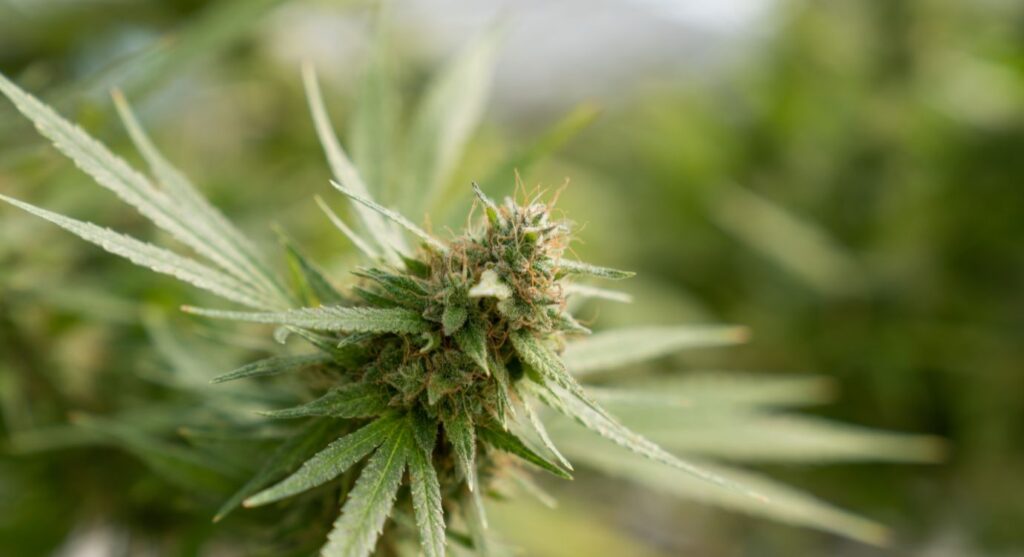
Medically reviewed by
It is not an exaggeration to say that the UK CBD industry has exploded recently.
Increasing awareness around CBD oil and government regulation changes have seen the CBD industry’s rapid development worldwide.
This is particularly true in the UK.
A little later in this post, we’re going to look at some jaw-dropping statistics showing just how much the UK CBD market has grown in the past couple of years – and the results are shocking!
But before we dive in, here is a summary of the most fascinating statistics for those who are short on time:
Let’s take a deeper dive into these CBD statistics and what they mean for the CBD industry.
Before diving into the stats, let’s take a quick look at CBD.
CBD, Cannabidiol, is a type of cannabinoid or compound that is found in the cannabis plant. It has been used for centuries to promote better general well-being.
Even though commercial CBD products these days are generally extracted from hemp, confusion about the differences between the hemp vs marijuana plants meant that CBD was not commonly accepted and was illegal in most parts of the world.
However, this changed with the legalisation of CBD products in the UK, the US and many other countries, and a flourishing CBD industry was born.
Fortunately, as people learn about CBD, it is becoming more accepted and increasingly popular – as demonstrated in the stats, which we’ll discuss later.
In the last few years, CBD sales statistics show a sharp spike in demand for CBD from UK consumers. This demand has translated into significant CBD industry growth in the UK.
Multiple signs suggest the demand is only set to increase in future years.
The studies we cover below show that CBD has a diverse presence in the British market with consumption patterns across different classes, ages, and industries.
In addition, the UK CBD market has a wide range of highly profitable products.
UK consumers are widely embracing CBD for its benefits, but some degree of stigma, not to mention misinformation, remains.
Read more: Is CBD oil legal?
Complete this one-minute quiz and find the right products for you.
Now that we’ve covered some basic CBD facts, it’s time to back them up with statistics.
In February 2023, Evopure conducted a CBD market survey with the assistance of Censuswide. The survey consisted of 10 questions and was conducted among 2007 demographically representative Britians.
These statistics have been combined with the results of other studies to form a comprehensive picture of the CBD market in the UK.
Let’s take a closer look at the results.
Who uses CBD? How many people use CBD? Why are people using CBD?
These answers lie in the CBD oil user demographics explained below
According to independent surveys by YouGov and Dynata in 2019, between 8 and 11% of the adult population in the UK (around four to six million people) had consumed a CBD product in the last year.
When asked if respondents have used CBD at any point in the past, 29% of respondents indicated they had used it before.
This shows that there is a drastic increase in the number of people using CBD each year.
This survey also found that males are 9% more likely to have tried CBD before, with 34% of males reporting that they have tried CBD, compared to 25% of female respondents.
The study found that the older people are, the less likely they are to have used CBD before. In fact, a Brit under the age of 24 is 3.5 times more likely to have used CBD than someone older than 55 (53% vs 15%).
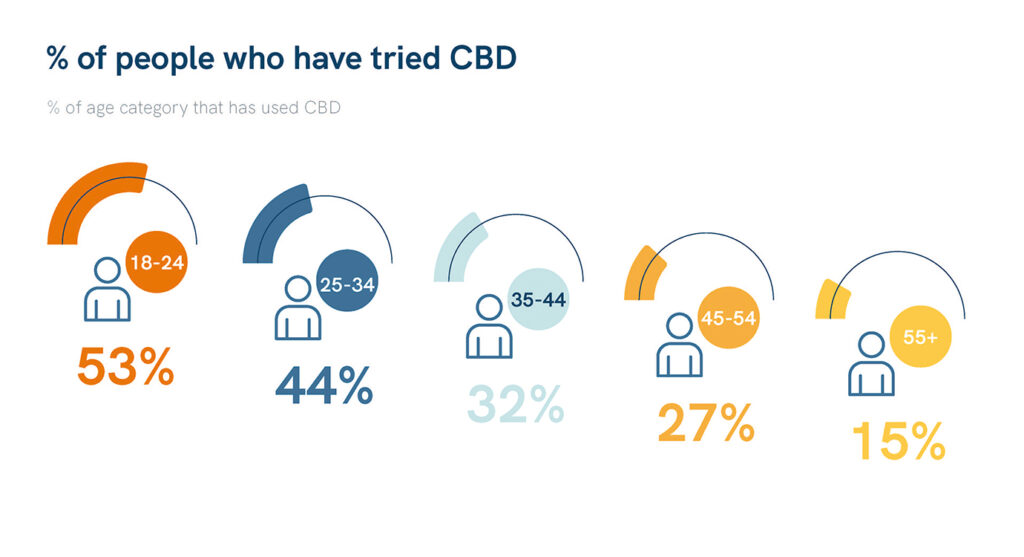
When asked how frequently they use CBD, 11% of respondents indicated that they use CBD every day, with 5% using CBD 4-6 days a week and 12% using CBD 2-3 days a week.
The biggest percentage of people (16%) indicated that they only use CBD once a week.
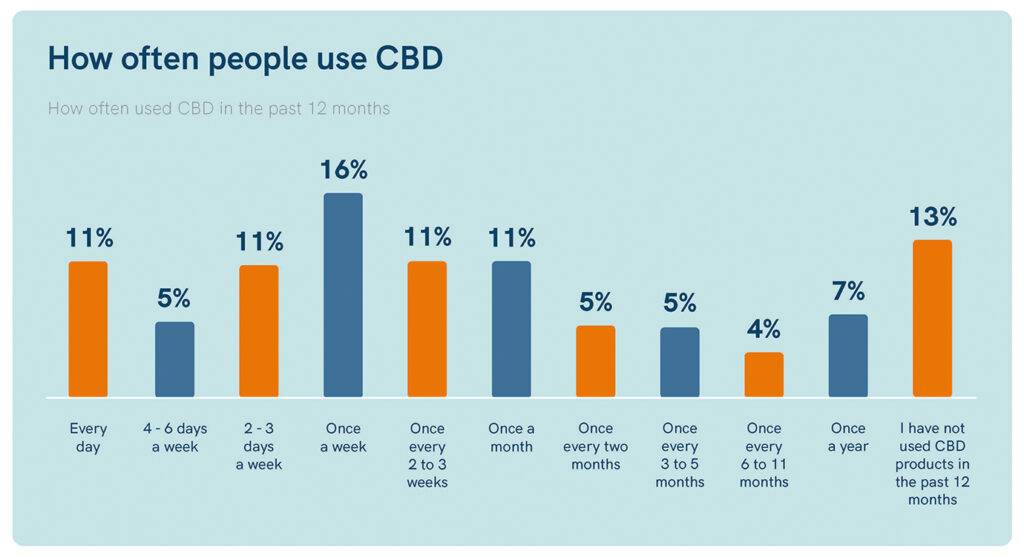
In the last 12 months (February 2022 to January 2023) CBD was used an average of 7.81 times per month. British males use CBD fewer times (7.64) per month than females (8.04).
Interestingly, as users get older, the average amount of times they use CBD per month increases, with users older than 55 using CBD the most times (11) per month. Therefore, the conclusion may be drawn that older people use CBD more consistently.
The average CBD dosage used is 28mg, with males using a higher average dose (29mg) of CBD oil than females (26mg).
CBD oil is the most popular CBD product, with 13% of survey respondents having used it before. This is followed by CBD gummies (7%) and CBD vapes (7%).
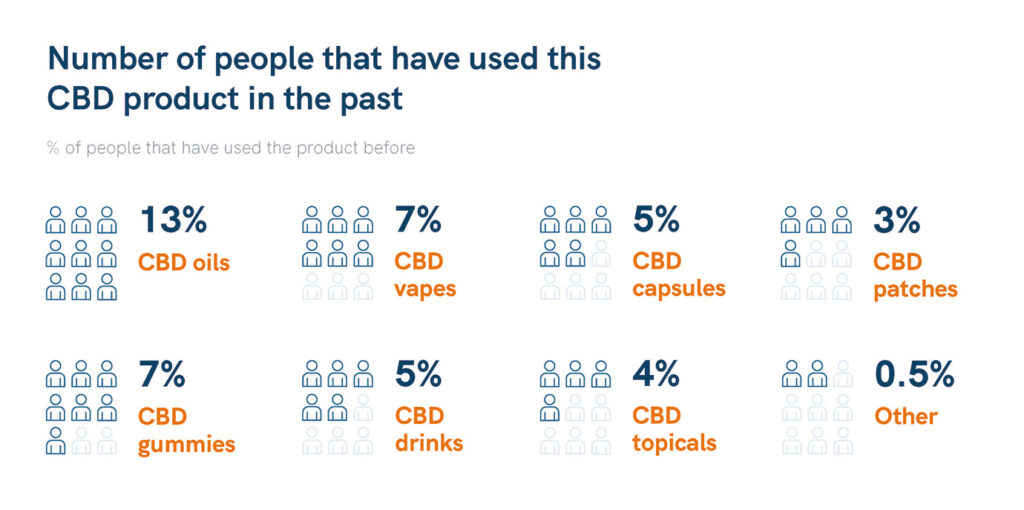
When asked which CBD products they have used before, results showed that respondents under 24 are most likely to have used a CBD vape. In this age group, 17% of users have used a CBD vape, followed by 15% who have tried CBD oil and 13% having used CBD gummies.
All users older than 25 are most likely to have used CBD oil before.
People who have used CBD once a month or more in the past 12 months spend an average of £34.25 on CBD products per month.
Excluding users without a clear preference, statistics show that there is a very small difference between users who prefer to shop online (54%) and those who prefer to shop in-store (46%).
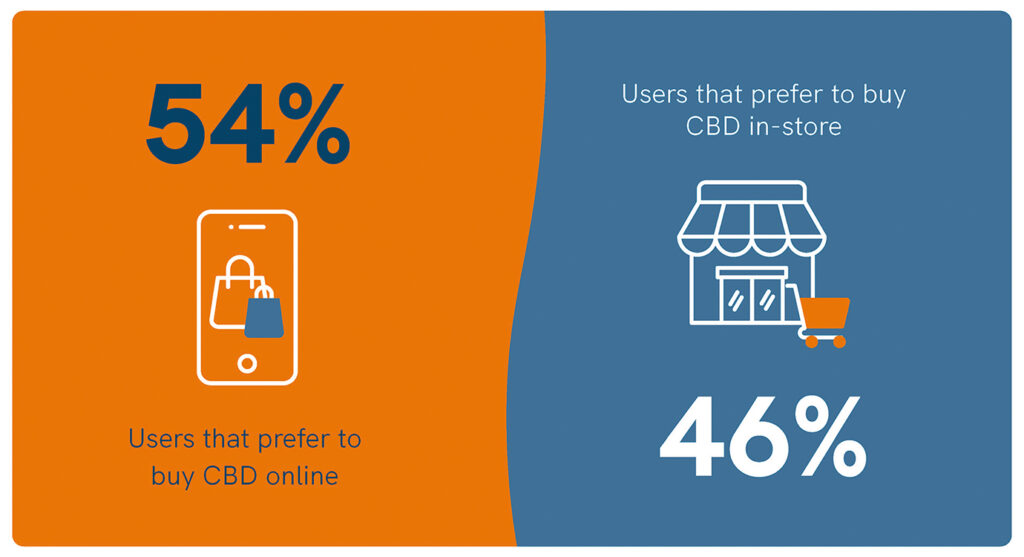
62% of CBD users younger than 24 prefer to purchase CBD products in-store, while all users who are 25 and older prefer to purchase CBD online.
The study showed that the most common reason for taking CBD was to improve sleep, manage pain and for anxiety.
Respondents in the poll gave their reasons for using CBD as follows:
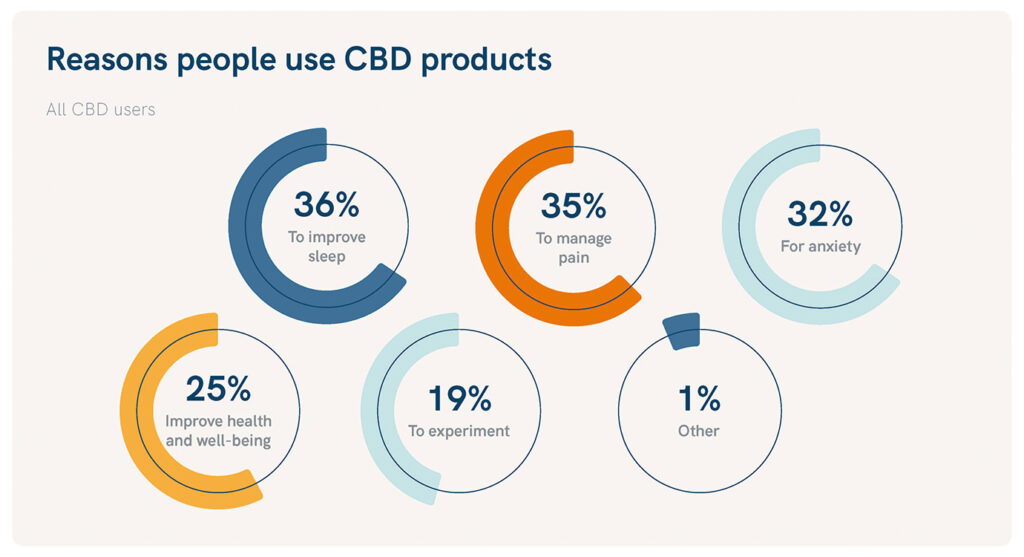
People who had never used CBD before were asked for what reasons they would consider using it. Results show that most respondents would try CBD to manage pain (12%), improve sleep (10%) and for anxiety (9%).
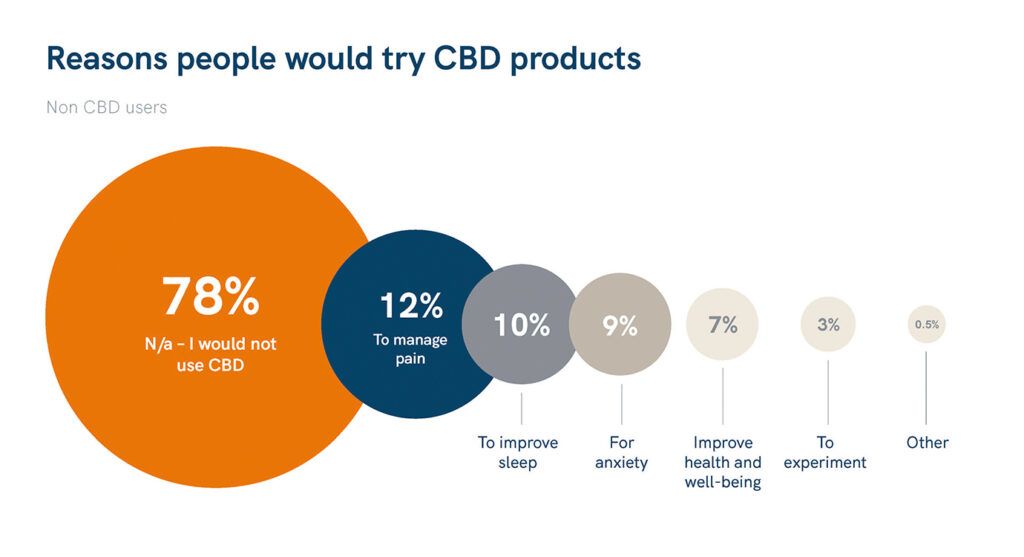
Of all people who have never tried CBD before, 17% cited the main reason not to have tried it is that they do not know what the benefits are. The second reason people have not tried CBD is that they are nervous about experiencing side effects.
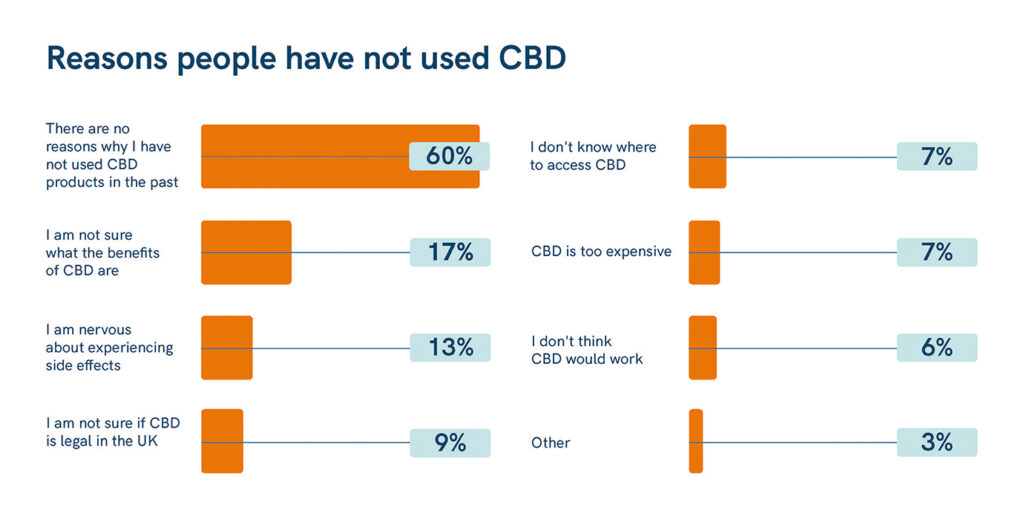
Interestingly, the same question revealed that almost 1 in 10 (9%) have never tried CBD because they are unsure whether it’s legal in the UK.
Read more: Is CBD legal in the UK?
Using a satisfaction with life scale, the survey determined that Brits who had used CBD in the past were more likely (63%) to say they were satisfied with life (NET) vs respondents surveyed who had not used CBD before (56%).
This is further backed up by the fact that Brits who have not used CBD in the past 12 months are more likely to say they are dissatisfied with life (22%) than to say they are satisfied with life (9%).
The survey asked participants what they looked for when choosing a CBD product.
It found that price is the biggest influencer when it comes to deciding which product to purchase. In fact, it is 1.5 times more important than the second biggest factor, which is clear product labelling.
Additional influencing factors, in order of importance, are consumption advice, CBD brand, organic and sustainable products, a COA and finally, that it is produced locally.
In addition, the study found only 16% of respondents care whether the CBD is produced locally, making this the least important buying factor.
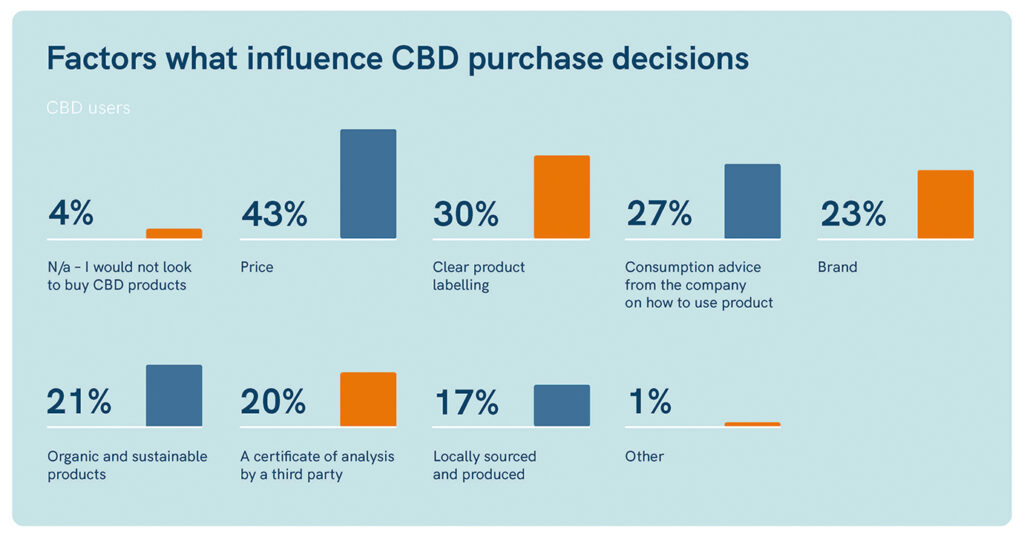
The survey asked participants whether they think CBD should be for sale over the counter at pharmacies, in high street stores or not at all.
Interestingly, excluding users with no clear preference for the sale of CBD, 100% of users agreed that CBD should be for sale over the counter at pharmacies.
Once again, excluding users with no clear preference, 13% of respondents agreed that CBD should not be for sale in the UK at all. In fact, respondents are 6x more likely to disagree than agree that CBD should not be for sale in the UK at all (87% vs 13%).
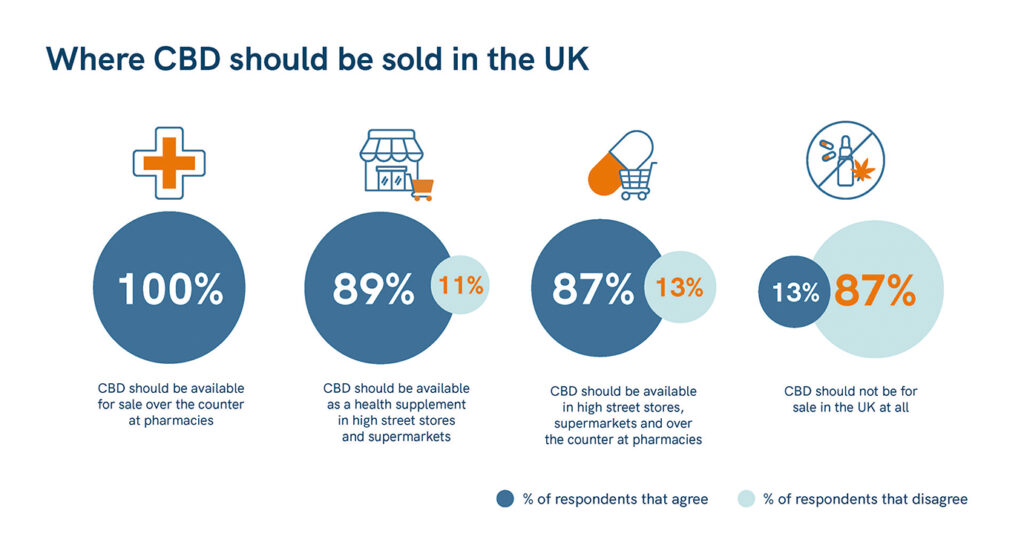
As the CBD market grows and develops, we are learning more about consumer behaviour and CBD market trends. This information is important not only for businesses in the industry but also for regulators.
In 2021, the UK’s Association for the Cannabinoids Industry and the Centre for Medicinal Cannabis (CMC) released a report,”Green Shoots: Sowing the seeds of the new UK cannabinoid market”, which investigates the various factors surrounding the rapid rise of the CBD industry.
They aimed to uncover the driving forces behind this growth by studying the changes that led to the market growth.
Let’s take a look at what they found.
The question often arises: How much is the CBD industry worth?
The report found that the total value of CBD sales for 2021 is estimated to be £690 million, which has increased from £314 million since 2019.
In fact, the UK market spends more on cannabis extract than on vitamin B and vitamin C combined.
The report also reveals that the United Kingdom has the second-largest consumer cannabinoid market in the world, preceded only by the United States.
Another report by the CMC, “CBD in the UK: Towards a responsible, innovative and high-quality cannabidiol industry”, predicts the CBD industry will grow to a whopping one billion pounds by 2025.
Although, if previous estimates are anything to go by, it could be much more!
According to this report, the UK has one of the largest CBD industries in Europe.
However, they also point out that the industry is wholly centred around processing, as the raw ingredient for the product – hemp – is imported from the continent or elsewhere.
As part of the CMC study, the organisation carried out tests on over 30 CBD products which are available for sale in the UK, using PhytoVista and other reputable laboratories to conduct the tests.
They sought to test the content, purity and quality of products in the UK CBD market.
Independent testing provides critical insights into the quality of products being sold on the UK market.
The results have strong implications for consumer rights, health and well-being, and even legality in some cases.
According to the CMC’s testing, only 11 out of 29 products tested (38% of the sample size) were accurately labelled for CBD; that is, they were within 10% of their advertised CBD content.
Another 38% of these products had less than 50% of their advertised CBD content. This included one product that did not have any CBD content at all.
In the same sample tests, more than 45% of the products had 0.04% of THC content, which is above the legal limit for CBD products sold in the UK.
One product also showed a high ethanol content of 3.8%, making it officially an alcoholic beverage and unfit for general sale.
These figures underscore the importance of being careful when buying any CBD product. Mislabelling and poor quality control are unfortunately all too common in the CBD industry.
However, as a consumer, you can take steps to protect yourself.
For more on staying safe and ensuring you purchase quality CBD products that will deliver the benefits you’re looking for, see our recent post on how to avoid CBD-related scams and misinformation.
UK CBD statistics reveal several trends and can allow us to predict the future of the UK CBD industry.
From the figures, it is evident that the UK CBD market is at an all-time high.
There is a constantly increasing demand for CBD products in the British market. Moreover, consumers are increasingly willing to try these products.
Users are also open to spending high sums of money on CBD products to invest in their well-being.
Future trends we are likely to see in the UK CBD industry include
Law and general policy are also expected to develop positively as the UK government pays more attention to CBD policy.
Changes to UK laws will likely result in a more regulated and secure CBD industry, which will offer more protection to the consumer.
The respective jurisdictions of South Africa, New Zealand, and the Channel Islands have adopted new policies for their CBD industries. These countries are using CBD in different products and for varied purposes.
This may indicate what is to come for the CBD industry in the UK, both in terms of regulatory reform and new products.
Recent studies into CBD provide more clarity about the CBD market than ever. They reveal the extraordinary growth of the CBD industry in the UK.
As the market grows, safeguarding consumers will be more important than ever. It is critical that consumers are well informed about CBD, its uses, risks and benefits.
This will be the responsibility of lawmakers, as well as CBD brands and manufacturers to provide accurate information to their customers.
It is also important that consumers educate themselves to avoid scams and make sure they buy the best product for them.
Sign up for the Evopure newsletter:
This product is not for use by or sale to persons under the age of 18. It should not be used if you are pregnant or nursing. Consult with a physician before use if you have a serious medical condition or use prescription medications. A Doctor’s advice should be sought before using this and any supplemental dietary product. This product is not intended to diagnose, treat, cure or prevent any disease.
© Evopure Ltd. All rights reserved Terms & Conditions Cookie Policy Sitemap